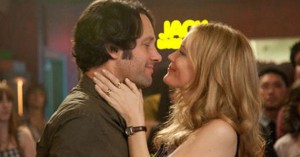 Once again, the insightful Judd Apatow has put his finger on Generation X in his new movie This is 40. Sadly, the result is not encouraging.
Once again, the insightful Judd Apatow has put his finger on Generation X in his new movie This is 40. Sadly, the result is not encouraging.
A fitful and disjointed series of vignettes insightfully paints a picture of a lost, selfish, and sometimes horrible couple who don’t like who they are and can’t find a way to change.
In a sort of sequel to his brilliant hit Knocked Up, Apatow follows Pete (Paul Rudd) and Debbie (Leslie Mann) as they hit the big four-oh in a swirl of crisis and stress. Their two daughters Sadie and Charlotte hate each other. Debbie’s father (John Lithgow) remains completely absent. Pete’s father (Albert Brooks) sponges off them to support his identical triplets with his new wife. Work is no better. Someone is stealing in Debbie’s shop and Pete’s musician agency is about to go under. He doesn’t want to tell Debbie about their worsening financial crisis. (Debbie’s sister Allison, the subject of Knocked Up, is neither shown nor mentioned. It’s up to the audience to imagine what horrible death caused the family to be completely unable to even say her name.)
And that’s just the beginning. Things get steadily worse from there.
Pete and Debbie spend much of the movie in the cyclical bonding and driving each other apart that married couples know so well. One minute they’re having sex (as they are in the opening credits) and another they’re calling each other names that would make a sailor blush.
The movie, like the rest of Apatow’s work, is rated R and not for the faint of heart.
Here and there, we see moments of brilliance. A particular favorite is the scene in which the couple tenderly and lovingly discusses their fantasies of how they would kill each other. That feeling is so familiar to married couples (or is it just me?) that the scene is hilarious.
Much of the movie, however, feels like a series of disjointed skits. Subplots involving hot employee/escort Megan Fox and sundry other friends go nowhere, but in scandalous ways. Some of the plot points feel like the eleven year old child in Apatow muttering naughty words to himself just for the fun of it.
Worse, however, is the excellent character development in Debbie and Pete. By the end of the movie, we not only dislike them, but actually think they are horrible, horrible people. The particularly grueling sequence begins funny when Debbie metes out a scathing, obscenity-laden diatribe to a junior high boy who has offended her daughter on Facebook. When the mother (Melissa McCarthy) very justifiably confronts Pete, he rallies ranks and administers his own, even more obscene rant on her. In the ensuing visit to the principal, the two stand shoulder to shoulder, play innocent, and blatantly lie, painting the wronged mother and son as crazy trouble makers.
Ha ha. What cards. Isn’t it lovely how they have each other’s backs?
Except I was 100% on the other mother’s side. I really wanted to see Debbie and Pete get their comeuppance, but it never happens.
Instead, they reconfirm their commitment to each other with a sort of ode to family, who sticks with you even when you’re despicable. Family, it seems, especially spouses, are the only people with whom you can actually be one’s ugly self.
There’s beauty in that message. But not enough.
When Debbie and Pete have loyalty only to each other and, peripherally to their children and parents, the world is essentially hollow. They are the center of their own universes with no mission nor cause other than not to kill each other before they die a natural death. Their marriage offers nothing to the world, makes nothing better. Even raising healthy and good children is not much of a goal for them.
This distressing image may be true for Apatow, who identifies so much with the script he wrote that his wife and children take starring roles, and it may be true for a great number of his and my generation. That is the most distressing part of all because although Pete and Debbie stay together, the audience would like to see some hope or joy in that rather than a shrug and an empty acceptance of a dreary future.












